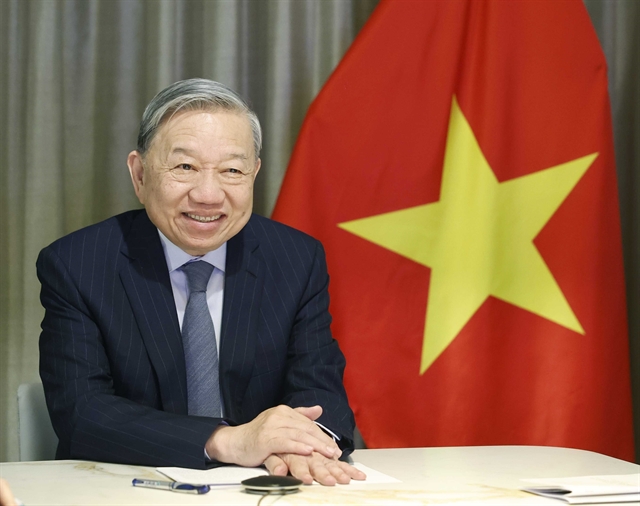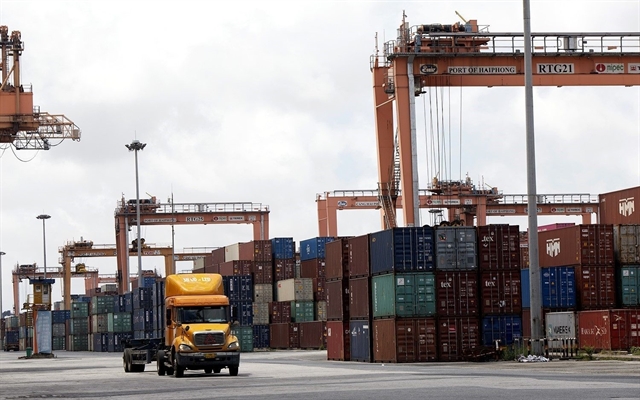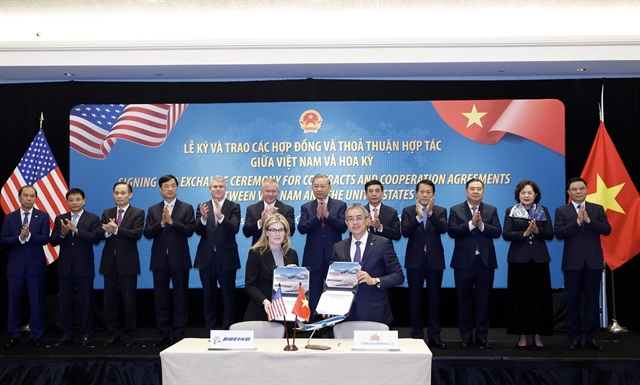 Politics & Law
Politics & Law


|
| National Assembly Secretary-General and head of the NA Office Lê Quang Mạnh, who also serves as Deputy Head of the supervisory delegation. —VNA/VNS Photo |
HÀ NỘI — The National Assembly’s supervisory delegation has proposed three breakthrough solution groups to be institutionalised, involving development mindset, transparent finance and technology to enhance the implementation of environmental protection policies and laws.
The proposal was made on Tuesday during the ongoing session of the 15th National Assembly (NA), which reviewed the report of the NA’s supervisory delegation on the enforcement of environmental protection policies and laws since the 2020 Environmental Protection Law took effect.
NA Secretary-General and head of the Office of the NA Lê Quang Mạnh, who also serves as Deputy Head of the supervisory delegation, reported that the Government, the Prime Minister, and relevant ministries and localities had issued more than 500 guiding documents to implement the law.
Environmental protection efforts have made substantial progress, achieving and even surpassing several key targets set by the 13th National Party Congress, according to the report. Việt Nam’s sustainable development index has improved, ranking among the top in ASEAN.
Three out of five major targets for 2025 have already been met ahead of schedule. These include the rate of urban solid waste collection and treatment meeting technical and environmental standards; the proportion of industrial zones and export processing zones equipped with standard centralised wastewater treatment systems; and the forest coverage rate.
The State budget for environmental protection has consistently been maintained at no less than 1 per cent of total public expenditure and continues to increase, reaching 1.12 per cent in 2024. Meanwhile, private and corporate investment in environmental protection has also shown positive momentum.
Waste management has notably improved, with solid waste collection and treatment rates rising to 97.26 per cent in urban areas and 80.5 per cent in rural areas by the end of 2024.
However, the supervisory delegation pointed out several shortcomings in law enforcement. Air quality has occasionally exceeded safe limits, posing health risks to residents, with Hà Nội and HCM City at times ranking among the most polluted cities in the world.
Water quality in certain river sections, particularly in densely populated areas, industrial clusters and craft villages along the Cầu, Nhuệ–Đáy and Bắc Hưng Hải irrigation systems, has been slow to improve.
The goal of eliminating all seriously polluting facilities by 2025, as set by the Party’s 13th Congress, remains incomplete. As of September 2025, 38 out of 435 facilities had yet to be thoroughly remediated.
While landfill use has declined, it still accounts for about 60 per cent of waste treatment, mainly in rural and smaller urban areas, and many landfill sites remain sources of pollution that have not been addressed promptly.
To tackle these challenges, the supervisory delegation recommended a renewed mindset and institutional reforms to strengthen environmental policy enforcement. It called for the economisation of environmental management, including the establishment of mechanisms for resource pricing, ecosystem service payments and enhanced environmental taxes, fees and emission quota systems.
Future priorities include diversifying resources for environmental protection, advancing science, technology, innovation and digital transformation, and strengthening climate change response.
As an urgent task to be completed by the end of 2026, the delegation proposed a comprehensive review of the 2020 Environmental Protection Law, with amendments and supplements to be submitted to the 16th National Assembly for consideration early in its term.
In the near term, it suggested revising several provisions of the law at the 10th session to unlock resources for socio-economic development, particularly those related to solid waste management policies to ensure alignment with practical needs.
The delegation also called for reviewing and updating relevant strategies, plans and programmes on environmental protection and climate adaptation; issuing and effectively implementing the National Action Plan on Air Pollution Remediation and Air Quality Management for 2025–2030, with a vision to 2045; and taking immediate measures to control and mitigate air pollution in Hà Nội and HCM City.
It further urged the completion of carrying capacity assessments and surface water quality management plans for key interprovincial river basins, as well as remediation of heavily polluted stretches of the Ngũ Huyện Khê, Tô Lịch and Bắc Hưng Hải waterways.
Finally, the delegation proposed the rapid completion and operation of a national environmental information and database system, ensuring integration and real-time data sharing with national databases, and the pilot establishment of a carbon credit exchange, as a first step toward developing Việt Nam’s domestic carbon market.
During the discussion on the supervisory delegation’s report, NA deputy Chu Thị Hồng Thái from Lạng Sơn Province highlighted the ineffectiveness of waste separation at source, a sound policy in principle that has faced numerous obstacles in practice.
She called on the Government and local authorities to review and adjust the planning of inter-regional solid waste treatment zones, prioritising the adoption of modern and environmentally friendly technologies to gradually reduce direct landfilling. She also emphasised the need to promote waste segregation at source, supported by a system of separate collection, transportation and treatment mechanisms.
Deputy Thái further proposed that the State develop supportive policies for enterprises and cooperatives applying modern waste treatment technologies, and quickly finalise financial mechanisms, including waste fees based on actual waste volume, while leveraging the Environmental Protection Fund to back advanced treatment projects.
Sharing similar concerns about solid waste management and classification, Deputy Hoàng Quốc Khánh from Lai Châu Province noted that 31 out of 63 provinces and cities (prior to administrative mergers) had yet to implement waste separation at source. Even in major urban centres, he added, progress remained limited.
He stressed that waste classification at source would be a fundamental solution toward fostering a green lifestyle, conserving resources and ensuring sustainable environmental protection. Achieving this goal, he concluded, would require synchronised and robust engagement across the entire system. — VNS




